|
|
|
Sort Order |
|
|
|
Items / Page
|
|
|
|
|
|
|
| Srl | Item |
| 1 |
ID:
192180
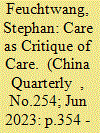

|
|
|
|
|
| Summary/Abstract |
Socialist governance and popular sovereignty require state administration of care. In the People's Republic of China (PRC) today, such state care is provided in the form of public services and in the guarantee of social security. Ideally, different levels of government should foster relations of care in local communities and remain responsive to “the people.” Local self-government, relations of mutual support and ritual communities, however, reveal the deficits of state care. Much like general philosophies of care, such local ethics of care propose universal benchmarks against which social practice can be measured. This article outlines the main contours of state care in the post-Mao Zedong PRC, and contrasts its findings with empirical research on public services, social security and ritual responsiveness. Mutual help, neighbourhood communities and ritual practice, in particular, provide alternative models of care. As such, they can be extended and universalized, and offer possibilities for a critique of care.
|
|
|
|
|
|
|
|
|
|
|
|
|
|
|
|
| 2 |
ID:
192189


|
|
|
|
|
| Summary/Abstract |
Does local democracy induce better service to citizens? While elected officials can be punished at the ballot box if they fail to address citizens’ needs, appointed bureaucrats may have policy knowledge that enables them to better serve citizens. Employing a multimethod design, this paper uses variation in local political institutions in Taiwan to assess the relative merits of direct election and bureaucratic appointment for local government responsiveness. While democratic institutions are often thought to induce responsiveness, I find that in Taiwan, with its historically strong bureaucracy and relatively new democratic institutions, the picture is somewhat more complicated. Elected and appointed officials face different incentives that motivate the latter to respond more quickly and effectively to online requests for help.
|
|
|
|
|
|
|
|
|
|
|
|
|
|
|
|
| 3 |
ID:
165884


|
|
|
|
|
| Summary/Abstract |
The popular notion of a trade-off between social and defense spending—or guns versus butter—appears often in elite discourse, popular media, and empirical studies of budgetary politics. Yet, there are good reasons to suspect that the public’s preferences for these types of spending do not reflect that trade-off. I develop a theory that whether social and defense spending preferences are competing or complementary depends on if the respondent views the government as an important contributor to job creation. Using data from fifty-nine surveys in twenty-seven countries from 1985 to 2008, I show that favoring government-financed job creation makes a respondent much more likely to view social and defense spending as complementary. Indeed, aside from the anomalous case of the United States, preferences are consistent with guns yield butter instead of guns versus butter. This theory has important implications for the thermostatic model of policy responsiveness and theories of budgetary politics.
|
|
|
|
|
|
|
|
|
|
|
|
|
|
|
|
| 4 |
ID:
140715
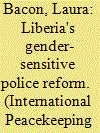

|
|
|
|
|
| Summary/Abstract |
This article presents a case study from Liberia that focuses on the relationship between police reform and women, peace and security. It explores the Liberia National Police's (LNP) innovative efforts between 2003 and 2013 to recruit more female officers and to train a specialized unit to address sexual- and gender-based violence (SGBV). The analysis focuses on two key goals of the LNP: representation, through the Education Support Programme, and responsiveness, through the Women and Children's Protection Section. Assessed by these two metrics, the Liberian police reform can be considered a qualified success, as the percentage of female officers rose from 2 to 17 per cent, and the LNP improved its response to SGBV reports. Success factors included the timing, context, local ownership and foreign development assistance. However, the sustainability and overall impact of the reforms was severely hindered by low technical capacity and weak rule of law.
|
|
|
|
|
|
|
|
|
|
|
|
|
|
|
|
| 5 |
ID:
182663


|
|
|
|
|
| Summary/Abstract |
Why is rebel governance more responsive in some areas than in others? In recent years, scholars have started to examine the determinants of rebel governance. Less attention has been given to explaining variation in the responsiveness of rebel governance, that is, the degree to which rebels are soliciting and acting upon civilian preferences in their governance. This article seeks to address this gap by studying local variation in rebel responsiveness. I argue that rebel responsiveness is a function of whether local elites control clientelist networks that allow them to mobilize local citizens. Strong clientelist networks are characterized by local elite control over resources and embeddedness in local authority structures. In turn, such networks shape local elites’ capacity for mobilizing support for, or civil resistance against, the rebels, and hence their bargaining power in negotiations over rebel governance. Drawing on unique interview and archival data collected during eight months of fieldwork, as well as existing survey data, the study tests the argument through a systematic comparison of four areas held by the Forces Nouvelles in Côte d’Ivoire. The analysis indicates that the strength of local elites’ clientelist networks shapes rebel responsiveness. Moreover, it provides support for the theorized civil resistance mechanism, and shows that this mechanism is further enhanced by ethnopolitical ties between civilians and rebels. These findings speak to the burgeoning literature on rebel governance and to research on civil resistance. In addition, the results inform policy debates on how to protect civilians in civil war.
|
|
|
|
|
|
|
|
|
|
|
|
|
|
|
|
| 6 |
ID:
178761
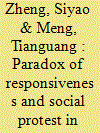

|
|
|
|
|
| Summary/Abstract |
Prior studies regard responsiveness as an effective institution for Chinese government to mitigate social protests based on the premise that citizens adopt more institutionalized channels as soon as the regime makes it available. We challenge this notion by arguing that institutionalized and noninstitutionalized channels are not substituting but complements, and improving responsiveness to institutionalized participation may ironically lead to more protests. We collected a unique dataset and employed machine-learning to measure the quality of local responsiveness. We find that improving responsiveness has a positive effect on protests and identify updating citizens’ beliefs on repression as major mechanism. The findings suggest the availability of new institutionalized channels may not have the intended substitutive effects on noninstitutionalized participation, and thus authoritarian co-optation could have unintended consequences.
|
|
|
|
|
|
|
|
|
|
|
|
|
|
|
|
| 7 |
ID:
172653
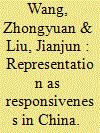

|
|
|
|
|
| Summary/Abstract |
Studies of political representation have focused on responsiveness driven by electoral mechanisms in liberal-democratic regimes. In a single-party system like China’s, how does the government respond to citizens’ service requests? Whose and what interests are being represented in governmental responsiveness, and to what extent? This article explores these questions through the lens of “representation as responsiveness” by analyzing an exclusive data set from the city public service hotline in Shanghai. Data analyses show that Chinese municipalities have good responsiveness to citizens’ practical concerns, and the quality of responsive representation has been improving in recent years. However, some groups of residents tend to be underserved for multiple reasons. This article argues that a responsive model of authoritarian representation will become a significant source of resilience for the party regime.
|
|
|
|
|
|
|
|
|
|
|
|
|
|
|
|
| 8 |
ID:
184751


|
|
|
|
|
| Summary/Abstract |
This paper compares and contrasts the behavioral tendencies between civil servants recruited from regular entrance examinations (REEs) and specially selected graduates (SSGs) in grassroots-level governments in China as they face a conflict between vertical (hierarchical) and horizontal (public) responsiveness. This study draws on a survey from 13 cities to explore behavioral variations in the two categories of civil servants. Two test methods (the OLS and mediation model) are adopted to verify the findings. This study finds that both the vertical and horizontal responsiveness of civil servants who are SSGs tend to be higher than those recruited from the REEs in facing the above-mentioned conflict. Four personnel mechanisms are tested to explain this variation: (1) the politicized recruitment and selection of SSGs, (2) job arrangements for SSGs, (3) triple leadership over SSGs, and (4) a fast-track stream for SSGs. Our analysis reveals that only the first two can account for this variation. This account can shed new light on the impact of the development of a separate corps of elites in China.
|
|
|
|
|
|
|
|
|
|
|
|
|
|
|
|
| 9 |
ID:
140203
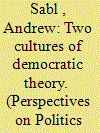

|
|
|
|
|
| Summary/Abstract |
Empirical political scientists and normative political theorists both seek to assess the quality of democracy. But they apply to this task very different criteria and assumptions. Empiricists (in particular those who study American politics) often assume that a—perhaps the—key indicator of democratic quality is responsiveness, the degree to which policy outcomes reflect public opinion. They often cite “democratic theory” as endorsing this criterion. Normative theorists, however, all but universally reject responsiveness, proposing instead very different criteria of democratic quality. I document a divide between two research cultures; trace some of its causes; and suggest some ways of overcoming it so that scholars on each side may benefit from the insights of the other. Empiricists, I argue, should acknowledge that the responsiveness criterion is neither value-neutral nor, in its pure form, particularly persuasive. Theorists adduce other criteria for sound and commonsensical reasons. In particular, to the extent that empiricists find that policy outcomes reflect not median voter preferences but either random factors or the concerns of the wealthy and organized, they would render their findings more compelling by presenting them as troubling according to a variety of persuasive democratic theories, not just a stylized theory that posits pure responsiveness as its ideal. Normative theorists, I argue, may learn from empiricists greater respect for ordinary citizens’ existing opinions, however imperfect the social and political circumstances in which they originate. and greater concern regarding empirical evidence that the median voter’s opinions may have little independent effect on policy. In spite of all this, the two cultures remain properly distinct in many respects. Some substantial differences in approach reflect a necessary, permanent, and salutary division of labor between two very different modes of studying democracy and assessing its quality.
|
|
|
|
|
|
|
|
|
|
|
|
|
|
|
|
| 10 |
ID:
174398
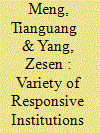

|
|
|
|
|
| Summary/Abstract |
The widespread use of the ICTs (information and communication technologies) has reshaped the state-society relations and is driving the diffusion of digital responsiveness, which is serving as a channel to link public opinions and policymaking. A growing body of literature focuses on how the Chinese government responds to the public in cyberspace. However, how responsive institutions are shaping the quality of responsiveness is underdiscussed. We explore a variety of responsive institutions in subnational China and examine their effect on response quality through automated text analyses to massive citizen-government interactive records. There exist six parallel typologies of responsive institutions, including party office, government office, inclusive agency, functional agency, supervision agency, and petition office. Compared with the others, party and government office, professional functional agencies are more likely to stimulate the improvement of response quality. Agencies with limited political authority often fail to make a highquality response. The degree of institutionalization does not improve response quality but facilitates response timeliness. Local leaders' demonstration behavior, however, counteractively has a positive effect on response quality.
|
|
|
|
|
|
|
|
|
|
|
|
|
|
|
|
|
|
|
|
|